Minerva Hase and Nikita Volodin: "We found the perfect match in each other"
March 26, 2025
By Reut Golinsky
Photo © Eva Maria Jangbro (EMJO), International Skating Union (ISU)
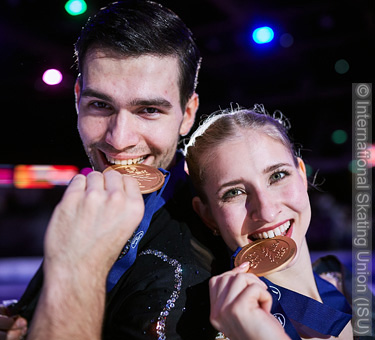 Minerva and Nikita's partnership took off last season with a meteoric rise. Though a challenging free skate at the Europeans 2024 kept them off the podium, they medalled at every other event they entered, culminating in bronze at Worlds 2024 in Montreal. This season, they've continued their momentum, winning every competition except for a silver at the Cup of China.They defended their Grand Prix Final title and claimed their first European title - the final medal missing from their collection (aside from the Olympic one, which is certainly in the plans).
Minerva and Nikita's partnership took off last season with a meteoric rise. Though a challenging free skate at the Europeans 2024 kept them off the podium, they medalled at every other event they entered, culminating in bronze at Worlds 2024 in Montreal. This season, they've continued their momentum, winning every competition except for a silver at the Cup of China.They defended their Grand Prix Final title and claimed their first European title - the final medal missing from their collection (aside from the Olympic one, which is certainly in the plans).
We spoke earlier this season, in January, during rehearsals for "Music on Ice" in Bellinzona, discussing their programs, mindset, areas for improvement, and more.
First and foremost, I have to say that what you've accomplished is truly incredible. It's been less than a year and a half since your first competition together, and look at how much you've achieved! What do you think is the secret?
Minerva: I think we found the perfect match in each other - not just in terms of technique and rhythm, but also in personality. We work well together. We're both extremely hard-working, we love competing, and we're driven to achieve good results. That's the mindset we bring to training every day, and that's what allows us to deliver in competition.
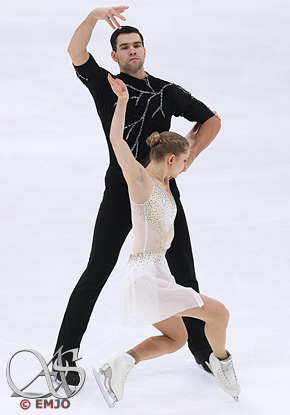 I was hoping for a partner like that, and I'm really happy I found Nikita. Now, we can push ourselves to reach our full potential in competition. And I think we still have more to show - we haven't reached our peak yet.
I was hoping for a partner like that, and I'm really happy I found Nikita. Now, we can push ourselves to reach our full potential in competition. And I think we still have more to show - we haven't reached our peak yet.
It gives the impression that you just clicked and everything fell into place immediately, but obviously, there's a lot of hard work behind it.
Minerva: We worked especially hard last summer to improve even more for this season. But I think from our very first practice, we felt that it just fit - the rhythm of most of the throws and twists clicked right away. Normally, it takes a lot more work to get in sync as a pair, but that was never an issue for us. It was more about finding the right technique that worked for both of us. I think that made everything come together much faster than usual, which isn't typical at all.
I read an interesting fact about you - that at the beginning, you couldn't communicate, and your coach had to translate for both of you.
Nikita: Yes, it was really strange because I didn't speak any English. I literally only knew a few words - "hello" and a couple of others. But I pretended to understand, just nodding and saying, "Yes, yes, yes" to everything.
So at first, it was more about feeling rather than talking. We skated, adjusted to each other, and found our rhythm without words. And surprisingly, a lot of things just clicked. For example, we both have a similar "sharp" takeoff on jumps, so they started working almost immediately. Within five days, we had our triple throw and, of course, all the lifts. The only thing that needed more work was the twist - it was more a matter of technique and timing. But now, I feel like we have the best twists I've ever done in my career. It's like assembling a puzzle, piece by piece. The most important thing is that we work on it together, pushing each other forward.
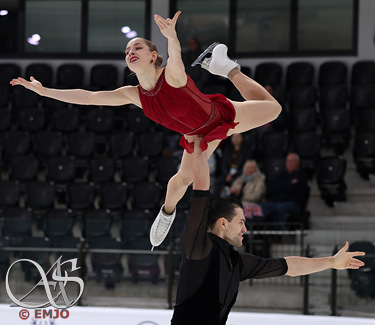 I have to say, I'm really impressed by how much work you put in here in Bellinzona. Not only did you rehearse your programs and group numbers, but you also worked on all your elements, squeezing in full practice sessions whenever you had a free moment.
I have to say, I'm really impressed by how much work you put in here in Bellinzona. Not only did you rehearse your programs and group numbers, but you also worked on all your elements, squeezing in full practice sessions whenever you had a free moment.
Minerva: We have a clear goal for Europeans, and there's not much time left. We had a five-day break last week, so now we need to get back into peak shape, which means making the most of every second. Even if we're tired from rehearsals, we push through and keep working on our elements. Nikita always says that if we can do it here, under show lights and with all the distractions, then we can do it anywhere. So we challenge ourselves now to make it easier later.
Nikita: We're young, we're fresh, and we have energy right now - it's the best time to show our potential. We also understand that our time in this sport isn't unlimited. But we have a lot of experience, and we want to make the most of it. This is the moment to prove we're ready.
Your rise has been so fast and so successful that at your first Europeans together last year, when you finished in the top five, it seemed like your biggest disappointment as a team. At least, that's how it looked. Do you think you're too hard on yourselves?
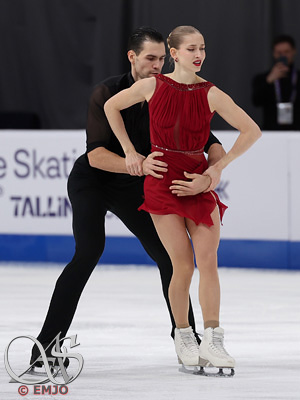 Minerva: We saw Europeans in Kaunas as a disappointment mainly because of our performance - we made mistakes that had never happened before. For example, lifts are usually one of our safest elements, so when one went wrong, it was a shock to us. That's why we were so frustrated. But of course, we were also disappointed with the placement.
Minerva: We saw Europeans in Kaunas as a disappointment mainly because of our performance - we made mistakes that had never happened before. For example, lifts are usually one of our safest elements, so when one went wrong, it was a shock to us. That's why we were so frustrated. But of course, we were also disappointed with the placement.
This season, we're trying not to focus on placements. Instead, we're aiming for clean performances because, as Nikita always says, if you skate clean, the scores and placements will follow. That's something I've been working on shifting my mindset toward - focusing on performance rather than rankings.
Nikita: Yes, it was a technical mistake. At first, we thought we had done something differently, but when we reviewed it, we realized we had performed the element the same way as always - we were just more tired than usual. Now, we're better prepared and more aware of how to handle situations like that. We analyze our mistakes, work to correct them, and aim for clean skates. Only after that can we think about results and placements.
I saw you at the Nebelhorn Trophy at the start of the season, and your free skate received a standing ovation. I remember standing there with everyone else, thinking: "You can't start the season at this level! Where do you even go from here?"
Minerva: (laughs) Honestly, I thought the same thing!
I think what helped us this season was keeping the order of the elements. Last season's free skate had the same order, and that's why it was easier to get the program going this year. We already knew where to focus more when we started getting tired. Still, we didn't expect to skate like that in Oberstdorf. After that skate, I thought: "Oh my goodness! Now that we've skated like this, what's next?"
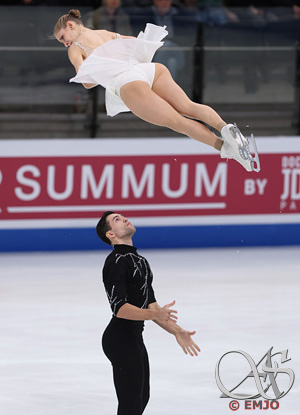 But Dima (their coach, Dmitri Savin - ed) told us: "Don't think about the past, always focus on the future." He teaches us to take it one program, one element at a time, and not to compare ourselves to others. Because, of course, the expectations were high: "If they skate this well at the start of the season, they have to beat everyone." But Dima tells us: "Forget about that. It's just you and Nikita on the ice - no one else." That mindset really helps me. Before every competition, he reminds us: "Don't think about the other teams. It's just you two, together, doing your program. That's what matters most." And that's what we try to focus on at every event.
But Dima (their coach, Dmitri Savin - ed) told us: "Don't think about the past, always focus on the future." He teaches us to take it one program, one element at a time, and not to compare ourselves to others. Because, of course, the expectations were high: "If they skate this well at the start of the season, they have to beat everyone." But Dima tells us: "Forget about that. It's just you and Nikita on the ice - no one else." That mindset really helps me. Before every competition, he reminds us: "Don't think about the other teams. It's just you two, together, doing your program. That's what matters most." And that's what we try to focus on at every event.
Nikita: There was an interesting moment at the Grand Prix Final. Everyone knew, and we knew, that we had earned a strong technical score. But since we didn't know how the other teams had skated before us - and we had made some small mistakes - we were genuinely surprised when we won.
Minerva: Yeah, that was really special.
We always approach every competition the same way. We block out the scores - we don't listen to them before we skate. That way, we're not influenced. If you hear that the teams before you struggled, you might think, "Oh, this will be easy," and lose focus. If you hear a high score, you might start panicking: "Now I have to be perfect!"
Nikita: Because you can't help it - your brain automatically starts calculating the possible outcomes. But your mind needs to stay clear, focused only on your own performance.
Minerva: And I think maintaining the same approach every time helps. No matter what happens before us, our priority is to go out there and do our job.
Getting back to your free skate at the Nebelhorn Trophy, what was also good about it is that now you know you can skate it at that level, as you already did.
 Nikita: Actually, the situation in Oberstdorf was a bit different because we were skating to a different version of the music.
Nikita: Actually, the situation in Oberstdorf was a bit different because we were skating to a different version of the music.
Minerva: We didn't have the copyright for the first part of our music, the "Winter" section, because it was performed by a lesser-known musician who didn't know that he needed to go through a specific procedure to clear his recording for public use. Since our federation was the organizer of the competition, they didn't want to take any risks. They said: "Either you change the music, or you can't skate." And all of this was because of the first minute and a half of the music. So, our choreographer spent the entire night searching for music with the correct rights that would still work with the other two sections.
On the bright side, we stopped thinking about the music and said: "We just need to focus on the first five elements and not worry about the music." Our choreographer cut the music perfectly, fitting the elements in, but we didn't really feel the choreography. The mindset was simply: "Just do it!"
Then, after the competition, the music company gave us the rights to use it. It just took longer than we expected. About a week after Nebelhorn, they contacted us to confirm that everything was fine, so by the time of the Grand Prix events, we could use it. But, in a way, this helped us at Nebelhorn. We were so stressed beforehand that during the competition, we just relaxed.
I wanted to ask you about "Music on Ice." It's your second time here, and you've already done other shows. What makes this one special?
Minerva: This one really feels like a family. Everyone is super nice, and it's so well organized - they really take care of the skaters, and we love it. The audience last year was amazing. The atmosphere was unique and warm; the rink was packed, and everyone seemed genuinely happy to be there. 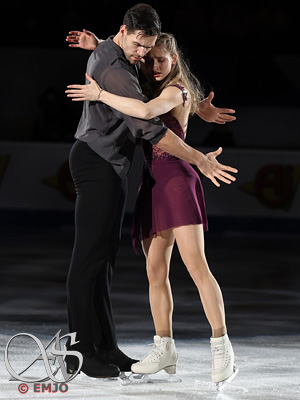 So when we were asked again, we agreed immediately. Skating in front of the audience is also good preparation for Europeans. We perform our short program here, a slightly different version, and it's good to practice skating under pressure. Our second program is our exhibition program to Lady Gaga, which is slower and more heartfelt.
So when we were asked again, we agreed immediately. Skating in front of the audience is also good preparation for Europeans. We perform our short program here, a slightly different version, and it's good to practice skating under pressure. Our second program is our exhibition program to Lady Gaga, which is slower and more heartfelt.
I saw that for "Art on Ice" this year, you worked with Benoît Richaud.
Minerva: Yes, Oliver Höner asked us if we might be interested in doing one program with Benoit, and we said: "Why not?" It's always great to work with new people, get fresh input, and explore new styles. We really enjoyed working with him. He came to Berlin for three days, and it was intense. I think we were sore all over because the movements were so different from anything we had done before. We got the music and a theme from Oliver, and then Benoit interpreted it. I think we came up with a great show program, and we can't wait to skate it.
Tell me more about your competitive programs this season.
Nikita: The free skate felt easier for us; it's classical, and that style is very comfortable for both of us. The short program, on the other hand, was something new. Neither of us, in any previous partnerships, has ever skated to blues. The emotions and feelings are very different - there's love, but at the same time, you're pushing each other away. It's this constant game of pulling and pushing. I think this style suits Minerva really well because she is a very bright, eye-catching skater. Although, at first, Mini wasn't very excited about this program at all.
Minerva: Yes, at first, I wasn't happy with the program. It's not the style I'm used to. I thought I had to play a role that I couldn't connect with, and I didn't feel the music either. 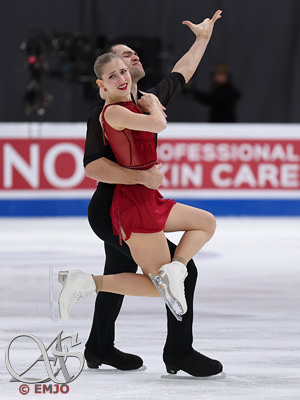 Plus, there's a specific rhythm and certain notes we have to hit with the elements. I thought it was too difficult, even impossible, but step by step, everyone convinced me, and I started connecting with the music more. In the beginning, Nikita wasn't sure either. At one point, he said: "I don't want to do this. Let's switch the program." But eventually, we both agreed that it wasn't so bad.
Plus, there's a specific rhythm and certain notes we have to hit with the elements. I thought it was too difficult, even impossible, but step by step, everyone convinced me, and I started connecting with the music more. In the beginning, Nikita wasn't sure either. At one point, he said: "I don't want to do this. Let's switch the program." But eventually, we both agreed that it wasn't so bad.
It's more than "not bad"; it's a really good program!
Minerva: The story of this program is about being once in a relationship but no longer together. We meet again at a club - this is where the inspiration for our costumes comes from - and we're playing with each other. There's still that tension and passion from when we were together. The program is like a play, where I want to take him in and then push him away. It's a constant dynamic of "come closer" and "go away." Now, I really like it, and I think it suits us both well. We both had to loosen up a bit. There's a lot of touching and sliding in this program.
Nikita: We're also not used to skating so close to each other; we're "typical" pair skaters. But if you want to be at the very top, you need to show you can dance and be different.
Although, yes, I agree that in a way, you are an embodiment of this very classical pair, with clean, long lines.
Minerva: Yes, that's something we hear often. People say we remind them of pairs from the past. It might sound "old" or not modern, but I know what they mean - we have good lines, and we show good pair skating. But we also try to blend pair skating with ice dance. There are parts where we're closer and more playful, and then there are parts where we focus more on the elements. I think we can still improve in this area.
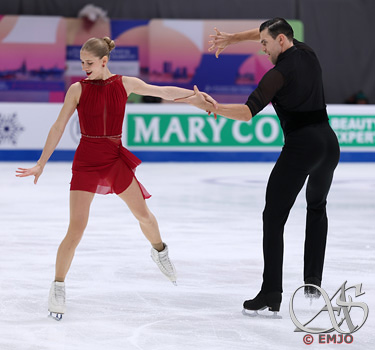 Nikita: We need more connection with the choreography elements. Sometimes it feels like we're doing elements first and then going back to the program. We're too focused on the elements, and after we do the big elements, we can focus on the choreography. But that's not the right way.
Nikita: We need more connection with the choreography elements. Sometimes it feels like we're doing elements first and then going back to the program. We're too focused on the elements, and after we do the big elements, we can focus on the choreography. But that's not the right way.
Minerva: To get better, we need to make the hard parts look easy. That's something we still need to work on.
Nikita: And you also need to perform them while being in your best shape, both physically and mentally. If you're not in shape, and you know how many points the elements bring, you'll focus only on them. To have a good flow in the program and show both the elements and choreography, you need to be in the best form possible.
Pairs will take the ice in Boston later today. The road to Milano-Cortina 2026 begins here - the first step in Minerva and Nikita's quest for an Olympic medal. With medals and Olympic berths on the line, the competition is sure to be an exciting one.



